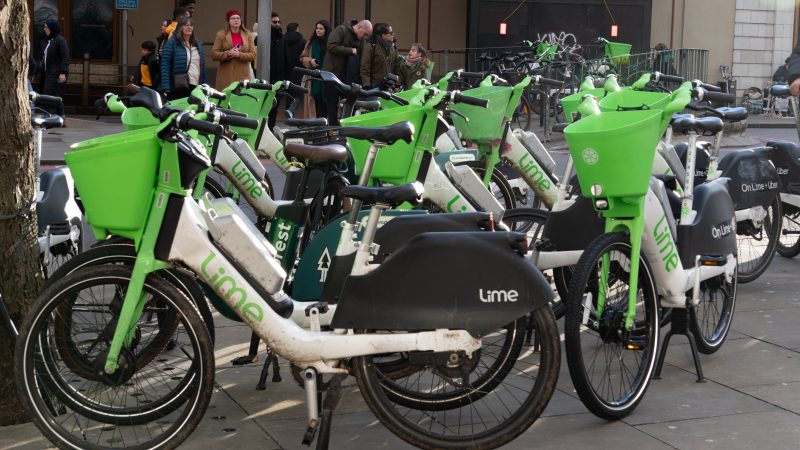
SPONSORED
People in UK towns and cities are changing how they move, and there is an increased demand for more transport choice. Shared e-bikes have entered the mainstream, getting people to work, to school and to the shops, providing a sustainable solution without the need for a car.
Nowhere is that more clear than in London. Cycling is at a record high with 1.3 million daily journeys, roughly a third of all Tube trips, and in the Square Mile, bikes now outnumber cars. When tube strikes shut down large parts of the transport network earlier this year, shared e-bikes filled the gap and kept the city moving, with an estimated 50% of tube users switching to cycling, walking or the Elizabeth line.
As the two largest shared e-bike operators in London, we have seen firsthand how quickly the city has embraced this shift. Lime rides grew by 85 per cent last year, while Forest has grown to over 1.5 million monthly journeys across the capital.
However this shift is not limited to London. In 2025 alone, new or expanded e-bike schemes have launched in major urban centres including Edinburgh, Glasgow, Leeds, Bristol and Nottingham, alongside growing networks in Oxford, Cambridge and Leicester.
Overcoming the challenges of expansion
As shared e-bikes become part of daily life in more cities, we are not blind to the challenges that come with such rapid change and have met them head on. Expansion has at times outpaced the infrastructure to support it, with parking pressure, inconsistent regulation and limited space on crowded streets all testing how cities adapt to new forms of transport.
But as responsible operators, we are responding. Earlier this year, Lime launched a £20 million London Action Plan – its biggest ever single-city investment – to make shared e-bikes safer and more convenient for everyone. That included a 40% increase in parking bays – funding over 930 across London in the last year and cutting overcrowding by 59% – a citywide “Respect the Red” safety campaign, and a partnership with Cycling UK offering free training for new riders.
Forest has taken a similarly proactive approach. We launched our own London Action Plan to increase the number of on-street staff across our operating area; rolled out AI-powered photo verification to improve parking compliance in real time; and introduced a unique £1 Ride initiative using real-time data and incentives to encourage riders to collect bikes from over-capacity bays or low-demand areas.
The e-bike opportunity
As we tackle the challenges of expansion, we must not lose sight of the opportunity it represents. Shared e-bikes are already one of Britain’s quiet success stories, cutting emissions, easing congestion and making active travel possible for people who might never have cycled before.
Recent analysis by transport consultancy Steer highlights the scale of what could be achieved. Using Department for Transport modelling, it found that if shared e-bikes were expanded across the UK, they could enable hundreds of millions of extra trips every year, generating over £550 million in health, environmental and economic benefits.
The report sets out how these gains are delivered. When shared e-bike journeys replace car trips, the impact is immediate – less congestion, cleaner air, and fewer road collisions. Reduced car use means fewer vehicle miles travelled, cutting greenhouse gas emissions and improving road safety.
Getting legislation right
The English Devolution and Community Empowerment Bill will hand new powers to Strategic Authorities giving them greater say over transport and planning, in particular giving further powers to design and manage shared e-bike schemes, so that decisions can be made closer to the people and places they affect.
If designed well, these powers could be transformative for towns and cities across the country. But for that to be realised, devolution must come with evidence-based direction and structure. Without clear national guidance, every area risks developing its own rules for parking, fleet management and procurement. That fragmentation would make it harder for operators to invest with confidence at scale, and for the UK to capture the social and economic benefits identified by Steer.
That’s why we are supporting the recommendation by Steer for the formation of a working group, between government, local authorities, operators and other community groups who are invested in growing cycling to develop practical, delivery-ready guidance alongside the Bill. This joined-up approach is exactly what’s needed to ensure shared e-bikes can continue to grow responsibly and deliver for every community.
The next few months are pivotal. By working together, operators, government and local authorities, we can build a framework for shared e-bikes that keeps streets safe, reduces congestion and delivers cleaner, healthier cities for everyone.
- SHARE: If you have anything to share that we should be looking into or publishing about this story – or any other topic involving Labour– contact us (strictly anonymously if you wish) at [email protected].
- SUBSCRIBE: Sign up to LabourList’s morning email here for the best briefing on everything Labour, every weekday morning.
- DONATE: If you value our work, please chip in a few pounds a week and become one of our supporters, helping sustain and expand our coverage.
- PARTNER: If you or your organisation might be interested in partnering with us on sponsored events or projects, email [email protected].
- ADVERTISE: If your organisation would like to advertise or run sponsored pieces on LabourList‘s daily newsletter or website, contact our exclusive ad partners Total Politics at [email protected].




More from LabourList
The cost of living crisis is still Britain’s defining political challenge
‘Nurses are finally getting the recognition they deserve’
Letters to the Editor – week ending 15th February 2026